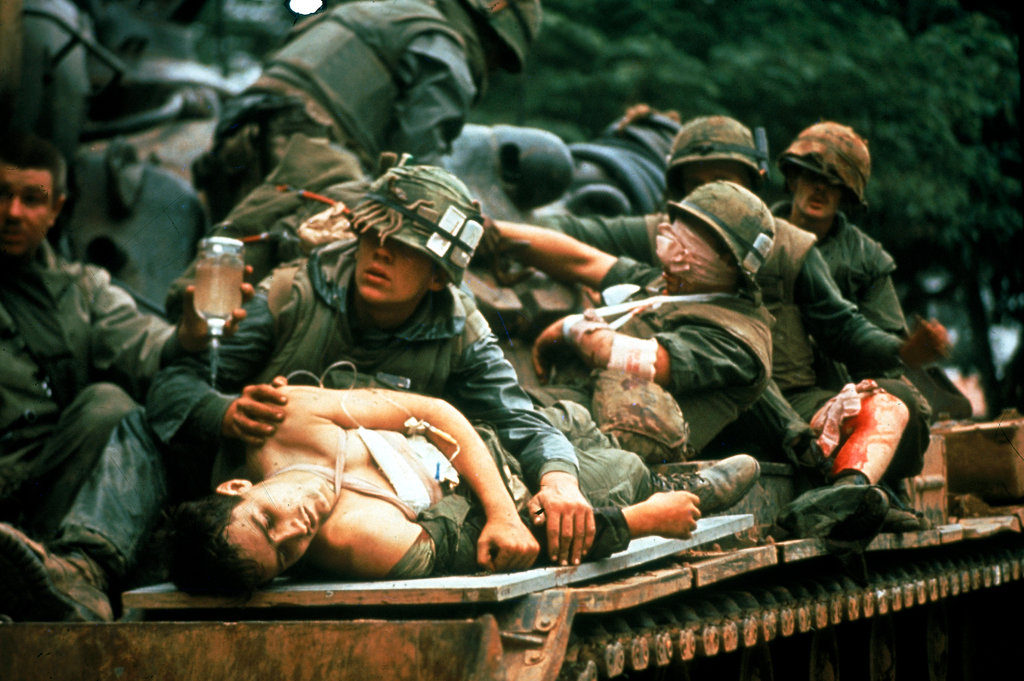The Daily Escape:

Wounded Marines carried on a tank during the fight to recapture Hue in the Tet Offensive in 1968 – photo by John Olson, The LIFE Images Collection. It is one of the most famous photographs from the Vietnam War. The pale figure is Alvin Bert Grantham from Mobile AL, who was shot through the chest. He survived.
Tuesday was the 50th anniversary of the 1968 Tet Offensive. Tet is the Vietnamese holiday that celebrates the lunar New Year. On that day, the North Vietnamese (NVA) and the Vietcong launched a massive military offensive all across South Vietnam. It was largely a surprise attack. The NVA thought their attacks would trigger popular uprisings throughout the country, and that the US military and the South Vietnamese could be beaten in a quick, though bloody battle.
They miscalculated. Within a month, the Tet Offensive was over, and the war continued for another seven years.
In “Hue 1968”, a remarkable book by Mark Bowen, (who wrote “Black Hawk Down”), Bowen faults General William Westmoreland, who days after Tet started, said that the country-wide attacks were a diversion from Khe Sanh, so he initially held back troops from Hue, and other Vietnamese cities.
Khe Sanh was the seat of the district government. US Special Forces built an airstrip there in 1962, and ultimately a fortified base. Westmoreland believed it was a strategic location both for covering the Demilitarized Zone (DMZ), and to cut off NVA infiltration from Laos. Bowen writes:
Indeed the attack he expected there [Khe Sanh] loomed so large in his mind that he had entertained the use of chemical and even tactical nuclear weapon (p. 314).
A few days later, Westmoreland wrote:
The use of tactical weapons should not be required in the present situation…. [but] I can visualize that either tactical nuclear weapons or chemical agents would be active candidates for employment (p. 315).
Imagine. In 1968, field commanders were willing to recommend using tactical nuclear or chemical weapons in a war that was not an existential threat to the USA. This is the type of nuclear weapon that the Trump administration is currently thinking of adding to our to-be-built nuclear arsenal. Also remember that Trump has delegated tactics to field commanders in the Middle East and Africa, our current Vietnams.
There are a few lessons to be learned from the Tet Offensive. You can say that it was the beginning of the end for our Vietnamese adventure, but it took until 1975 for us to finally leave.
One thing that changed forever was the US public’s faith in what LBJ and the generals were saying about the war. Both had grossly oversold our progress to the American people, and Tet made that clear. More from Bowen:
For decades…the mainstream press and…the American public believed their leaders…Tet was the first of many blows to that faith in coming years. Americans would never again be so trusting (p. 505).
The publication of the Pentagon Papers in 1971 sealed the deal. They showed that American leaders had been systematically lying about the scope and progress of the Vietnam War for years.
After Tet, there was no more conjecture in the White House or Pentagon that the war could be won quickly or easily. The debate moved from how to win, to how to leave.
A month later, LBJ decided not to seek reelection. Westmoreland was soon removed as the field commander. And 1968 also brought the assassinations of Dr. King and Robert Kennedy, and then, the riots. Richard Nixon was elected eight months later, promising not victory, but that he had a “secret plan to bring the war to an honorable end”.
What have America’s presidents and generals learned from the Tet Offensive? We know that the military teaches future commanders about Vietnam to no apparent effect. It is still re-fought by our military. And almost half a century after Tet, they haven’t won it yet.
The Pentagon got the Trump administration to agree to a new “mini-surge” in Afghanistan intended, in disturbingly Vietnam-esque language, to “reverse the decline,” and “end the stalemate”. The Pentagon convinced Trump that more troops will do the trick.
This is tragedy bordering on farce. And sadly, there is no course in quagmire management for future presidents.
Vietnam was, in truth, a 21-year war, from our first advisors at Dien Bien Phu, where the French were defeated in 1954, to that last helicopter in Saigon in 1975.
Afghanistan is now a 17-year war, with about as realistic hope of ending successfully as Vietnam had at the 17-year mark. And much like in Vietnam, we have no real strategy, and no long-term realistic end state that we can see.
The only thing that keeps Afghanistan going is that very few Americans have a relative in the fight, because we ended universal conscription in 1973.
That was one lesson from Vietnam that our military accepted and put into practice.

One of the problems that was presented here was the blindness of our focus on freedom vs communism. We may have been right in knowing that the other side would govern oppressively, but that does not matter. People would prefer to be governed by their own man – even if the man is a thug or a communist dictator. And yes, the Vietnamese educated class didn’t want communism, but they were mostly urban and Catholic and could not sway those in the rice paddies.